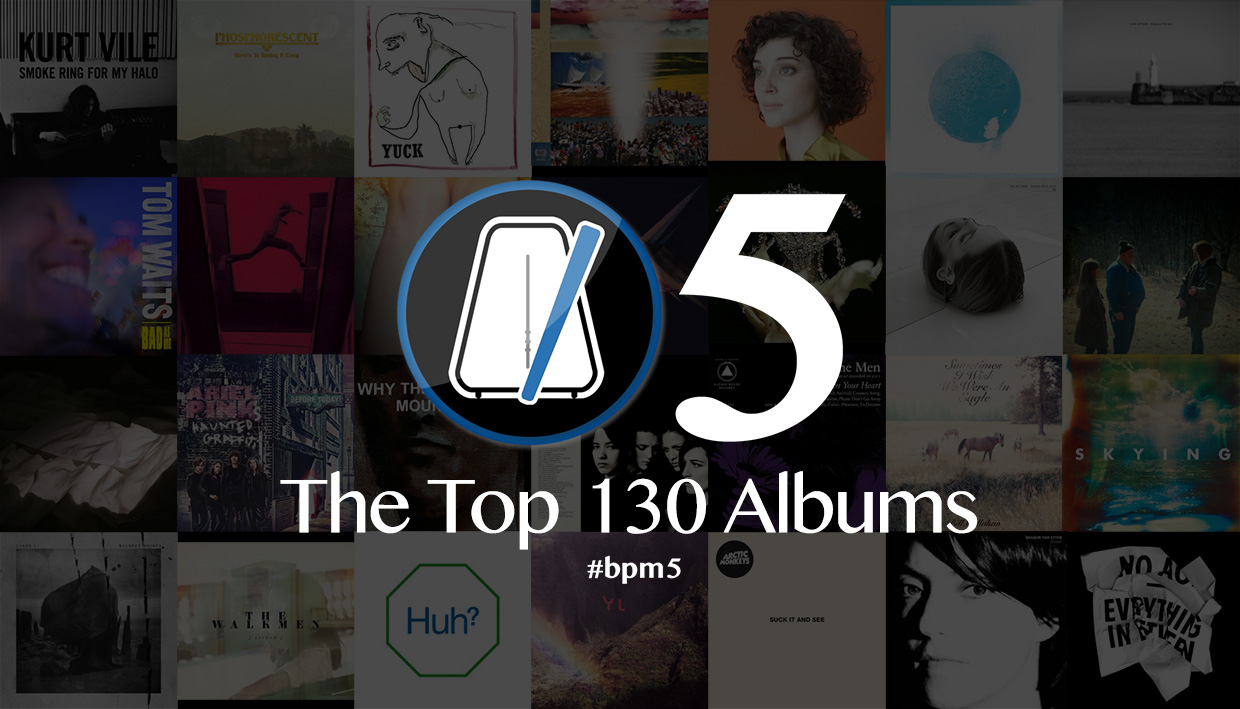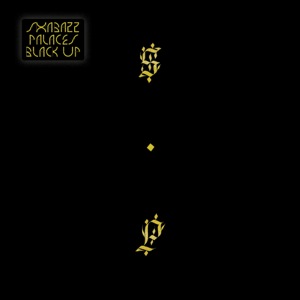
30
Shabazz Palaces
Black Up
[Sub Pop; 2011]
With Black Up, Ishmael Butler, formerly Butterfly of Digable Planets, returns from a sort of rap abyss sounding older, wiser, and a bit weirder. Blessed with murky, minimalist beats from producer Knife Knight, he delivers one of the most unique and interesting rap records of recent memory.
As one may surmise, Butler has changed his stance a bit from his jazz-influenced, “Cool Like Dat” days. Still rapping behind a pseudonym, this time the mysterious Palaceer Lazaro, Butler avoided interviews, publicity and the limelight behind this new persona – an attitude befitting the dark, mysterious project.
There are no snapping hooks or supremely chill vibes here. This is a rap record for aliens to bump as they patrol the endless darkness of space. This is look-into-the-void rap. Rhymes are stacked dark and thick, tough to see through, but Butler’s flow constantly delivers intriguing lines through the deep synths and spacey production. He rattles off one-liners that other rappers would base whole choruses – or whole careers – off. And occasionally, we get glimpses into the man behind the shadows. “Musically and bitch-wise too, I lost the best beat that I had,” he raps on album opener “free press and curl” before declaring simply and repeatedly, “I’m free.”
And he does sound finally free, unburdened by expectations or hype. In an era where our conversations are recorded and beamed across the world via satellite, this is a soundtrack for those who want to disappear and simply enjoy floating through space. Re-upload yourself some real rap.
– Brian Hodge

29
Titus Andronicus
The Monitor
[XL; 2010]
The Monitor is a dense, sprawling epic that doesn’t immediately make itself known. The New Jersey punk outfit, Titus Andronicus, led by indomitable yell-singer Patrick Stickles, set out to make a record equally inspired by German philosophy and Bruce Springsteen while using the American Civil War to frame its us-vs-them social politics. It’s the kind of record that packs a biting critique of small town alcoholism to the sounds of a drunken sing-a-long (“Theme From ‘Cheers'”). The songs on The Monitor average at about seven minutes, with the longest–the mammoth, battle-hymn closer “The Battle of Hampton Roads”–passing the 14 minute mark. In between words from Abraham Lincoln and abolitionist William Lloyd Garrison, Titus Andronicus constructs rollicking, multi-part punk dramas, Stickles unleashing eternally frustrated cries against status quo evils with some of the most cutting and immediate lyrics since Neutral Milk Hotel’s Aeroplane Over The Sea.
The Monitor is a political record, built as a complex and nuanced social allegory, with things to say about society and how people live, in a time when listeners would rather not hear criticism aimed back at them. But The Monitor is too physical and involved to label “preachy” or “pretentious.” And the ambiguity of the record’s us-vs-them stance is entirely intentional. It captures the eternal battle between conscious and unconscious lifestyles and while the band wants to be on the side of the former, it’s telling that on songs like the devastating piano ballad “To Old Friends and New” they fall tragically nearer to the latter. The Monitor is a battle for the soul of America, of Titus Andronicus, of Patrick Stickles. It reflects a battle that exists within all of us. There’s a lot of frustration and heartbreak to be found on The Monitor, but ultimately it’s a record that wants us to be better.
– Will Ryan
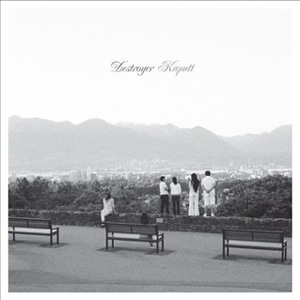
28
Destroyer
Kaputt
[Merge; 2011]
No longer content to contain his cryptic, mad-genius lyricism in a shell of “European Blues,” Dan Bejar threw his jangly rock sounds out the window in favor of the musical stylings of elevators and department store PA systems. The cheese is layered on thick – twinkling synths and “Careless Whisper” saxophones dominate the arrangements – but it provides a surprisingly fitting background for Bejar’s breezy, offhanded musings. At the same time, they recall the hollow, corporate machinations that created pop music in the ’80s, Bejar’s teen years (“I was 20 years old in 1992 / I was bathed in golden sunlight, all right” he reminds us on “Bay of Pigs.”) Where his early album Thief served as a more pointed critique of the music industry, Kaputt is a resigned one, apathetic to the dichotomy of pop versus indie. After all, as Bejar muses on the title track, “Sounds, Smash Hits, Melody Maker, NME / All sounds like a dream to me.”
– Harrison Suits Baer
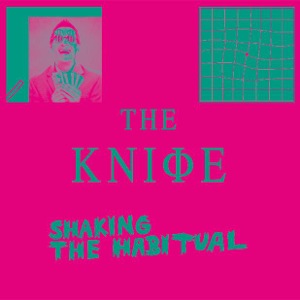
27
The Knife
Shaking The Habitual
[Rabid; 2013]
After Silent Shout beguiled many across the world with its haunted-yet-human cold electronica back in 2006, what The Knife would come up with next was the question on everyone’s lips for years to come. Seven years later they punched their way into the ears of listeners again with the brooding and almost lustful “Full of Fire.” Nine minutes long, full of synths and drum tracks that kick each other until a strange smoothness emerges, and with a robotic anti-disco breakdown to boot at the end, it’s safe to say that no one could have predicted the sound of “Full of Fire” – or anything else from Shaking The Habitual for that matter.
The Swedish duo’s third album is a long, challenging journey, that can feel like an ordeal at times – but that’s the point. “It’s nice to play with people’s time these days,” Karin Dreijer Andersson said of the album, and Shaking The Habitual forces you to engage with it, take it piece by piece, and analyse what you’ve got. If that doesn’t sound like a whole lot of fun, then you’re right (though the album does have it’s “fun” moments, like the playful, caffeinated warble of “Networking”). Getting something from the album requires you to put something into it, which is something that might lead to cries of pretension, but considering how successful and important Silent Shout was and came to be, The Knife deserve to be in this position. Shaking The Habitual proves this once more; whatever they do next (and whenever it might arrive), we’ll definitely all be listening intently.
– Ray Finlayson
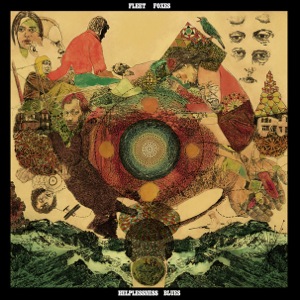
26
Fleet Foxes
Helplessness Blues
[Sub Pop; 2011]
With 2008’s introductory double salvo of Sun Giant EP and their self-titled album, Fleet Foxes burst onto the scene in an array of brightly coloured, nature-packed and harmonized alt-folk glory that instantly captured the ears and hearts of a new breed of folk lovers. Following up this feat was never going to be easy, but Fleet Foxes did it magnificently with 2011’s Helplessness Blues. The facets of their sound remained, but this time they turned inwards for inspiration, singer Robin Pecknold expounding on his own neuroses and shortcomings through means of looking at nature, family and the world at large in comparison to his own life path. Helplessness Blues was a also a huge leap in ambition; the multi-part harmonies that characterized their sound from the out were no longer mere adornments but were now rolling and cascading soundscapes themselves; the instrumentation was more intricate and varied; songs often pushed the five minute mark, and the gargantuan “The Shrine/An Argument” went beyond eight; some songs had distinct musical movements; and, leading it all, was Pecknold with a more forceful and heartfelt lead vocal than we might have expected from listening to their earlier output. Where Fleet Foxes was life appreciating, Helplessness Blues was life affirming.
– Rob Hakimian
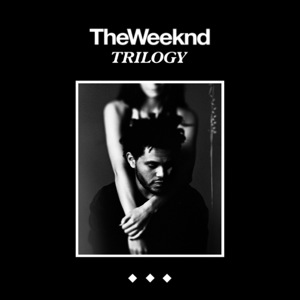
25
The Weeknd
Trilogy
[Republic; 2012]
How do you release three fantastic albums of material within just nine months — all for free? Well Ontario’s new R&B prince Abel Tesfaye aka The Weeknd finally saw his payday with world tours and the release of both three-disc compilation Trilogy and his new album Kiss Land on Republic Records through his new XO imprint.
Despite being a fan of the new record and The Weeknd’s live show (I just saw him for the third time at Radio City last week) there was something special about that first year of music in which the singer remained shrouded in mystery.
House of Balloons is Abel’s 50-minute pop masterpiece setting the lustful tone of his content matter to amazing production from Doc McKinney and Illangelo featuring samples from Aaliyah, Beach House, and the Cocteau Twins. I’m convinced its singles would have been all over the radio had it seen a proper major label release. Thursday is the modest followup which may not be as consistent as its predecessor but has just as great highs in songs such as “Gone,” “Rolling Stone,” and “The Birds Part 1.” Surely the Drake collaboration didn’t hurt at all. But my favorite is the third album, the the pitch black Echoes of Silence, which Tesfaye allegedly wrote during a dark period of his life in Montreal. Doc McKinney had left the production team but the gaps are filled up by the baroscopic sounds of DROPXLIFE and Clams Casino as Tesfaye explores the depths of his hedonism. Furthermore opener “D.D.” — a cover of Michael Jackson’s “Dirty Diana” — is evidence that The Weeknd may in fact be the best vocal talent since the late great King of Pop himself.
Not a bad start at all.
– Evan Kaloudis
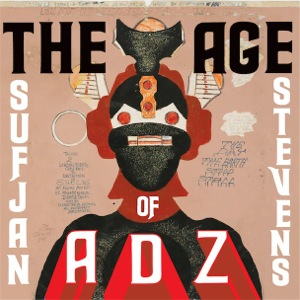
24
Sufjan Stevens
The Age Of Adz
[Asthmatic Kitty; 2010]
Talk shit all you want about Sufjan’s most recent record, he hasn’t lost it–whatever it was anyway. Was it the knack for expansive instrumentation? The Age of Adz has that in spades, just look to the trilling electronics on “Impossible Soul.” Was it the intensely emotive and sentimental songwriting? Check out “Too Much.” He’s retained everything that made his previous records so immediate and thrilling and added a gleeful schizophrenia, a wonderful experimentation to the already potent songs. “You Are The Blood,” Stevens’s contribution to the 2009 indie superstar compilation, Dark Was The Night, should’ve been a sign of things to come. Glitchy electronics married to pure emotion and a slight smirk. No one could have pulled it off except for Sufjan. Did you really expect anything else from a man who was touring for years wearing angel wings? You really should have seen it coming, you really should have loved it.
– Colin Joyce

23
My Bloody Valentine
M B V
[m b v; 2013]
If you say you saw this one coming, I don’t believe you. Kevin Shields, after an eternity on the sidelines, in the bedroom hiding out from everyone–from himself, even–emerges with a masterpiece. I’ll forgive you for trying to point me toward Loveless, but I’ll raise you m b v. Fractured as it may be, Shields jumped straight back into the fray as only he ever could, dreary, bleak and welcoming all at once, this record parries the expectations that over 20 years of waiting could build. Who would have expected “She Found Now” as the first new sounds that these Irish folk would bring to the table after such a big gap? It’s a pure dream and it’s pure gold, even as the record twists into “Wonder 2″‘s pummeling kicks Shields shucks expectations and favors experimentation–and the songs at the same time. You can dream any My Bloody Valentine record you want after 20 years, but m b v is better than anything your slumbers could have conjured and it’s better than anything we deserved.
– Colin Joyce
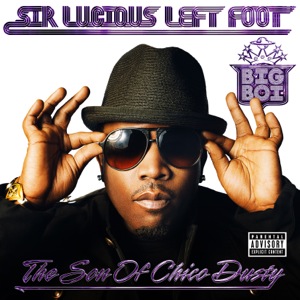
22
Big Boi
Sir Lucious Left Foot: The Son Of Chico Dusty
[Def Jam; 2010]
If you think back to a decade ago (yeah, Speakerboxxx/The Love Below is a decade old), OutKast’s two members were remarkably distinct in their artistry. Big Boi was the literate, street-smart storyteller, Andre 3000 the trippy, poetic philosopher. Building on the strengths of Speakerboxxx, Big Boi’s Lucious Left Foot was formidable proof he wasn’t just the more grounded half of OutKast, he was minting a currency of his own. Teeming with imagination and intelligence, his true solo debut is everything you can ask for from a rap album. The cinematic production calls on his dirty South roots, plus jazz, funk and electro and his tight, dexterous flow glides over all, stacking verses faster than you can count them: “The rhymes I design are truly unrefined/ Like diamonds with a speck of blood dug up out the mine.” How often does a rapper come across as boastful and self-aware at the same time?
– Brendan Frank

21
Tame Impala
Innerspeaker
[Modular Recordings; 2010]
While Lonerism turned Tame Impala into bona fide indie heavyweights, it was Innerspeaker that first got us watching the scale. The album is an immaculate serving of bright, psych-rock, beginning with the easygoing drift of “It Is Not Meant To Be” and following up with the driving one-two punch of “Desire Be Desire Go” and “Alter Ego.” The songs flow into one another in a colorful haze, and Kevin Parker’s Lennon-like vocals are filtered with just the right amount of fuzz. If I didn’t know any better, I might listen to the whole album thinking it was one long song, but my answer to that comes at the end of this album: I don’t really mind.
– Harrison Suits Baer

